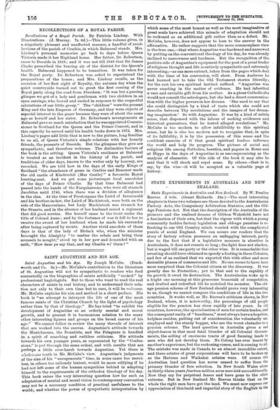SAINT ATJGUSTINE AND HIS AGE.
Saint Augustine and his Age. By Joseph McCabe. (Duck- worth and Co. 6s.)—Mr. McCabe's contribution to the literature of St. Augustine will not be sympathetic to readers who feed contentedly on the biographies of saints artificially "cooked" by professional hagiologists. But to those who want to read the real characters of saints in real history, and to understand their rela- tion not only to their own time but to ours, it will be welcome. Mr. McCabe explains his aim and method in a short preface. His book is "an attempt to interpret the life of one of the most famous saints of the Christian Church by the light of psychology rather than by that of theology." He has tried "to exhibit the development of Augustine as an orderly mental and moral growth, and to present it in harmonious relation to the many other. interesting figures and groups on the broad canvas of his age." We cannot follow in review the many threads of interest that are worked into the canvas. Augustine's attitude towards the Idanichaeans, the Donatists, and the Pelagians is handled in. a spirit of searching and ruthless criticism. His attitude towards his own younger years, as represented by the "Confes- sions," is put through the same ordeal, and with results that are perhaps a little over-harsh towards Augustine. Yet there is wholesome truth in Mr. McCabe's view. Augustine's judgments of the sins of his " unregenerate " time, in some cases too merci- less, in others too callously lenient, would be more edifying if he had not left some of the human sympathies behind in adapting I himself to the requirements of the orthodox theology of his day. This book raises the very interesting question how far such an adaptation of mental and moral vision to contemporary convention may not be a necessary condition of practical usefulness to the world; and whether the power of sympathetic interpretation by which some of the most honest as well as the most imaginative of great souls have achieved this miracle of adaptation should not be reckoned as an additional gift rather than as a defect. Mr. McCabe, however, does not appear to lean to the answer in the affirmative. He rather suggests that the more commonplace view is the true one,—that where Augustine was hardened and narrowed by putting on the conventional theology of his day, he was already inclined to narrowness and hardness. But the recognition of the positive side of Augustine's equipment for the post of a great leader of religious thought and life is entirely sympathetic and extremely interesting,—as one more extract, taken from the pages which deal with the time of his conversion, will show. From Ambrose ho had learned not to take the Old Testament stories literally; for the rest his own spiritual instinct sufficed. "Augustine was never exacting in the matter of evidence. He had inherited a rare and enviable gift from his mother. As a pious Catholic she would not consult the astrologers, but she had a direct communica- tion with the higher powers in her dreams. 'She used to say that she could distinguish by a kind of taste which she could not describe between Thy revelations and the images of her dream- ing imagination.' So with Augustine. It was by a kind of subtle sense, that dispensed with the labour of seeking evidences and historical guarantees, that he tested alleged revelations." Mr. McCabe is too modern to allow infallibility to this spiritual sense, but he is also too modern not to recognise that, in spite of its fallibility, it is by the possession of this sense and the confident exercise of it that great spiritual leaders influence the world and help its progress. The picture of social and religious life among Catholics, heretics, and pagans in Rome and at Hippo in the days of Augustine is as uncompromising as the analysis of character. Of this side of the book it may also be said that it will shock and repel some. By others—that- is to say, by the wise—it will be accepted as a valuable page of history.






















































 Previous page
Previous page